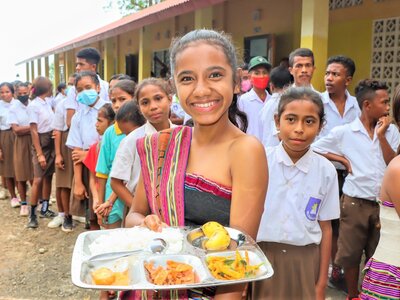Timor-Leste
- 27%
- of people are acutely food insecure
- 47%
- of children under 5 are stunted
- 1.3 million
- population
Although Timor-Leste has made significant progress since gaining independence in 2002, this Small Island Developing State is confronted by challenges including poverty, food security and malnutrition.
The agricultural sector is critical for livelihoods, employing about 70 percent of the population, yet remains largely subsistence-based with limited market access. Agricultural productivity is low.
Mountainous terrains and unpredictable climate-related shocks – including droughts, floods and irregular rainfall – exacerbate food-production issues. Reliance on imports for over 60 percent of its food supply makes households additionally susceptible to both domestic supply chain disruptions and price fluctuations.
What the World Food Programme is doing in Timor Leste
-
Nutrition
-
WFP supports the Government in achieving national nutrition targets by enabling year-round access to diverse and nutritious diets, particularly for groups with higher nutrient needs, such as young children, adolescent girls, and pregnant and nursing mothers, with a particular emphasis on the first 1,000-days from pregnancy to a child's second birthday. To assist vulnerable families, WFP facilitates access to fortified foods rich in essential vitamins and minerals.
-
Social and Behaviour Change Communication
-
Food security
-
School meals
-
Logistics
-
Emergency preparedness and response
Timor-Leste news releases
Go to pagePartners and donors
Find out more about the state of food security in Timor-Leste
Visit the food security analysis pageOperations in Timor-Leste
Contacts
Office
Colmera, Vera-Cruz, Av. Presidente Nicolau Lobato, Edificio SAPT, Páteo Square
Dili
Timor-Leste


